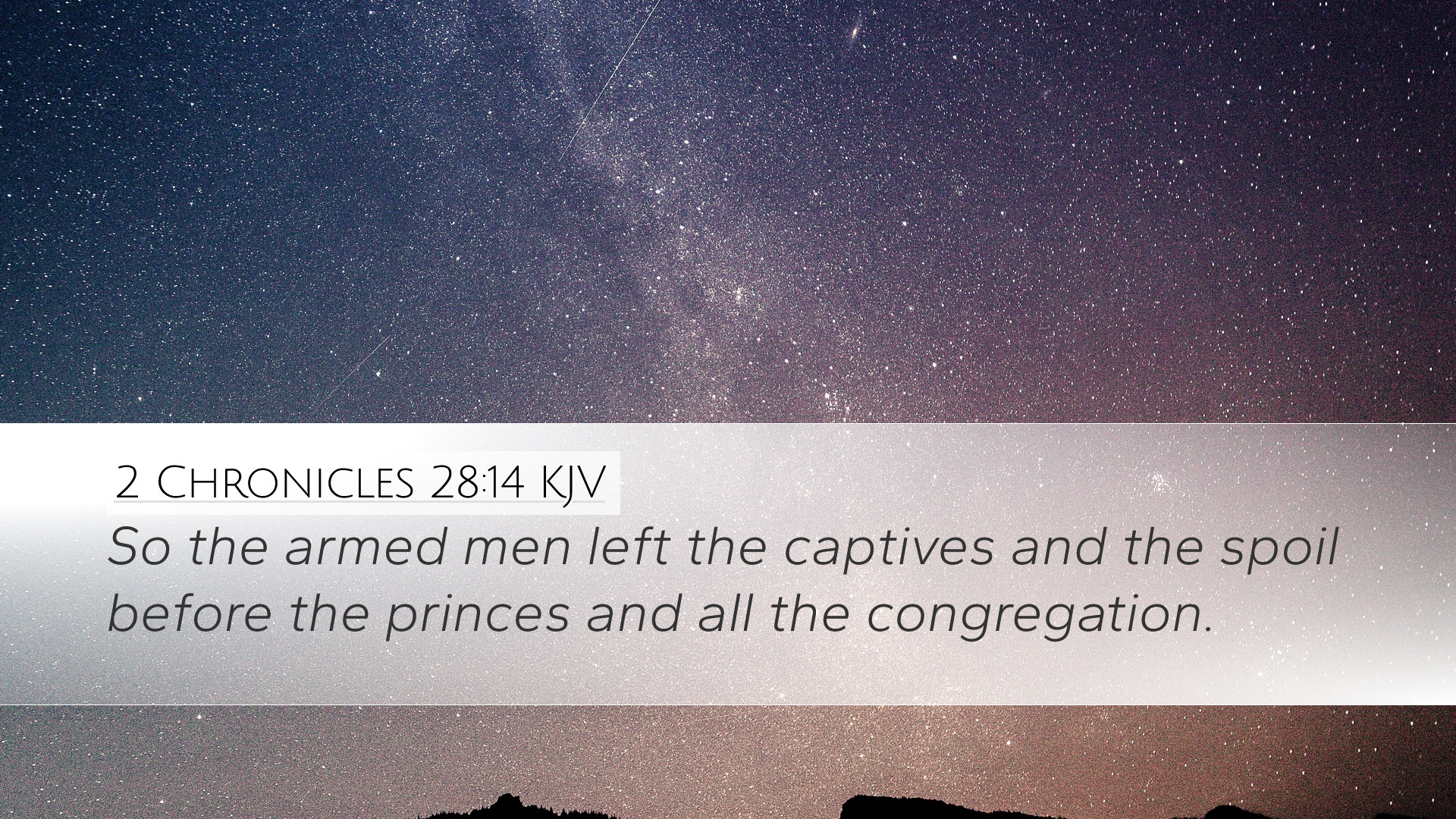Commentary on 2 Chronicles 28:14
2 Chronicles 28:14 states:
“So the armed men left the captives and the spoil before the leaders and all the assembly.”
Contextual Overview
This verse is situated within the narrative of King Ahaz's reign in Judah, which is marked by idolatry and disobedience to God. The context reveals a tumultuous period wherein the Northern Kingdom of Israel, under the leadership of Pekah, launched attacks against Judah. This was a time of significant strife and divine judgment, yet also of mercy, as seen in the interactions between the two kingdoms.
Insights from Commentaries
Matthew Henry's Commentary
Overview of Ahaz's Sin: Henry emphasizes the wickedness of King Ahaz, noting that his actions not only provoked God’s wrath but also placed Judah in a vulnerable position. The events leading to this verse illustrate the dire consequences of departing from the ways of the Lord.
The Role of the Armed Forces: Henry highlights the role of the armed men who, despite being victors, chose to leave the captives and spoil. This act showcases a sense of morality and restraint, likely influenced by divine conviction. It suggests a pivotal moment wherein men acted against their immediate instincts for gain, instead considering the consequences of their actions.
Albert Barnes' Notes on the Bible
Significance of Captives: Barnes elaborates on the significance of the captives left behind. In times of war, captives often represent not just prisoners but also a choice toward mercy and humanity. The decision to leave captives can be seen as a response to divine instruction or a realization of the unjust nature of their previous actions.
Divine Intervention: Barnes points out that God’s providence is evident in the situation, emphasizing that the deliverance and the eventual outcomes were orchestrated by divine will. The leaders’ decision to return captives may be viewed as a reflection of a deeper spiritual awakening or as an indication of God’s mercy at work even amid turmoil.
Adam Clarke's Commentary
The Assembly's Reaction: Clarke offers insight into the reaction of the leaders and the assembly to the situation. He suggests that their ability to forgo personal gain for the sake of mercy highlights a turning point in their spiritual journey. This moment may have rekindled a desire for righteousness and restoration as they understood the weight of their actions.
The Educational Aspect: Clarke also notes the educational implications of this event. By choosing not to massacre the captives, the leaders of Judah potentially set a precedent for future generations regarding mercy, justice, and the character of their leadership. This moment serves as a powerful lesson in humility and accountability.
Theological Reflections
This verse can be universally applied to contemporary faith practices. It invites church leaders and believers alike to consider:
- The Call to Mercy: Just as the leaders spared the captives, Christians today are called to exhibit mercy in their interpersonal dealings and community engagements.
- Divine Sovereignty in Chaos: The verse illustrates that God can bring about significant transformation even in chaotic circumstances. This serves as a reminder of His sovereignty and grace.
- Accountability in Leadership: The actions of the leaders reflect their accountability to God. Today’s leaders must recognize their influence and responsibility to act justly, advocating for those oppressed or wronged.
Conclusion
In summary, 2 Chronicles 28:14 offers rich insights into the complexities of leadership, mercy, and divine intervention. Through the combined insights of historical context, moral decisions, and theological implications, we find a passage ripe with lessons for both individual conduct and corporate church practice. This verse serves as a bridge between the historical narrative of Judah and contemporary reflections on faithfulness, reminding scholars, students, and pastors alike of the enduring principles found within Scripture.


